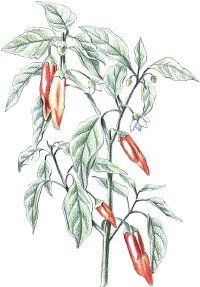Are you a hot salsa or chili fan? Then you'll want to learn more about the virtues of the cayenne pepper. These ripe fruits of the Capsicum genus are widely used as a popular spice, but cayenne peppers also are dried and powdered or tinctured for medicinal purposes. In this article, you will learn some herbal remedies using cayenne pepper as well as some precautions you should take when using this fiery plant.
Uses of Cayenne Pepper
Cayenne stimulates digestion and muscle movement in the intestines, which helps restore deficient digestive secretions and aids absorption of food nutrients. (Stomach acid tends to decline with age, and some cases of poor digestion are related to a lack of this acid.)
Advertisement
Cayenne also stimulates circulation and blood flow to the peripheral areas of the body. Because it stimulates digestion and circulation, cayenne is often added to a wide variety of herbal remedies; it improves the absorption and circulation of the other herbs throughout the body.
Have you ever gone after the chips and salsa with gusto and then felt flushed and drippy in the nose? Cayenne warms the body and stimulates the release of mucus from the respiratory passages. Anyone who has eaten cayenne knows that hot peppers can clear the sinuses and cause sweating.
Cayenne actually can raise the body temperature a bit, as it stimulates circulation and blood flow to the skin. An herb such as cayenne or ginger that promotes fever and sweating is considered to have a diaphoretic (sweat-inducing) action. This action can help reduce fevers and relieve such the congestion of colds and sinusitis.
Cayenne has become a popular home treatment for mild high blood pressure and high blood cholesterol levels. Cayenne preparations prevent platelets from clumping together and accumulating in the blood, allowing the blood to flow more easily. Since it is thought to help improve circulation, it's often used by those who have cold hands and feet.
You can use cayenne peppers topically as a pain-relieving muscle rub and joint liniment. The source of the heat is capsaicin, the fiery phenolic resin found in most hot peppers. Capsaicin causes nerve endings to release a chemical known as substance P. Substance P transmits pain signals from the body back to the brain.
When capsaicin causes substance P to flood out of the cells, you experience a sensation of warmth or even extreme heat. When the nerve endings have lost all of their substance P, no pain signals can be transmitted to the brain until the nerve endings accumulate more substance P. For this reason, topical cayenne pepper products are popular for the treatment of arthritis, bursitis, and for temporary relief of pain from psoriasis, herpes zoster, and neuralgia (nerve pain). These cayenne preparations are most appropriate for long-standing chronic conditions, not acute inflammations.
Cayenne often is found in diet and weight-loss formulas. But can eating hot peppers really help you lose weight? Probably not, but cayenne may support your diet and exercise efforts. Because it aids in digestion and absorption of nutrients, cayenne can reduce excess appetite that is due to malabsorption, a common condition in overweight people.
In the next section, you will learn how to prepare cayenne pepper for herbal remedies and some of the potentially dangerous side effects.
To learn more about treating common medical conditions at home, try the following links:
- For an overview of all of our herbal remedies, go to the main Herbal Remedies page.
- To learn more about treating medical conditions at home, visit our main Home Remedies page.
- One of the best things you can do for your health and well being is to make sure you are getting enough of the vital nutrients your body needs. Visit our Vitamins page to learn more.
This information is solely for informational purposes. IT IS NOT INTENDED TO PROVIDE MEDICAL ADVICE. Neither the Editors of Consumer Guide (R), Publications International, Ltd., the author nor publisher take responsibility for any possible consequences from any treatment, procedure, exercise, dietary modification, action or application of medication which results from reading or following the information contained in this information. The publication of this information does not constitute the practice of medicine, and this information does not replace the advice of your physician or other health care provider. Before undertaking any course of treatment, the reader must seek the advice of their physician or other health care provider.Before engaging in any complementary medical technique, including the use of natural or herbal remedies, you should be aware that many of these techniques have not been evaluated in scientific studies. Use of these remedies in connection with over the counter or prescription medications can cause severe adverse reactions. Often, only limited information is available about their safety and effectiveness. Each state and each discipline has its own rules about whether practitioners are required to be professionally licensed. If you plan to visit a practitioner, it is recommended that you choose one who is licensed by a recognized national organization and who abides by the organization's standards. It is always best to speak with your primary health care provider before starting any new therapeutic technique.
Advertisement
